
The US Air Force (USAF) announced an experimental XQ-58A Valkyrie drone has been officially flown under artificial intelligence (AI) control last week.
The Air Force Research Laboratory (ARFL) stated the test flight happened on July 25 at the Eglin Test and Training Complex in Florida, which saw the drone entirely AI-controlled for around three hours.
The test followed about two years of research and development (R&D) between a partnership with Skyborg Vanguard, a team made up of personnel from the Air Force Research Laboratory, and the Air Force Life Cycle Management Center with the intent of creating unmanned fighter aircraft.
Loyal Wingman to the F-35
The XQ-58 is an unmanned combat aerial vehicle (UCAV) created and developed by Kratos Defense & Security Solutions which is currently tested as part of the US Air Force Low-Cost Attritable Strike Demonstrator (LCASD) program, specifically under the USAF Research Laboratory's Low-Cost Attritable Aircraft Technology (LCAAT) project portfolio. It was designed to be a stealthy drone that could function as a "loyal wingman" to the human-piloted F-22 or F-35.
"This sortie officially enables the ability to develop [artificial intelligence and machine learning] 'agents' that will execute modern air-to-air and air-to-surface skills that are immediately transferrable to the [collaborative combat aircraft] program," USAF Chief of AI Test and Operations Col. Tucker Hamilton.
The Autonomous Air Combat Operations (AACO) team at the lab developed algorithms for the flight, as per Interesting Engineering, spending millions of hours perfecting the algorithms through simulations, sorties with the X-62 VISTA experimental aircraft, working with the XQ-58A, and conducting ground test operations.
AI's Future in the MIlitary
Meanwhile, the US Department of Defense would continue to explore AI applications with industry partners to enhance the military's autonomous capability.
As loyal wingmen, the XQ-58 would fly alongside human pilots and 6th-generation combat aircraft during sorties, with AI pilots being the "critical element" to the future of warfighting, according to ARFL commander, Brig. Gen. Scott Cain.
"AI, Autonomous Operations, and Human-Machine Teaming continue to evolve at an unprecedented pace, and we need the coordinated efforts of our government, academia, and industry partners to keep pace," he added.
Related Article: Ground Drones May Revolutionize Military Technology in Ukraine
© 2026 HNGN, All rights reserved. Do not reproduce without permission.








